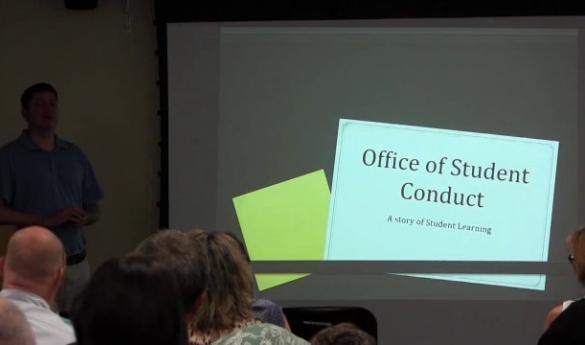OPINION: Legal representation hinders the goals of student conduct process
Dear Editor:
Thank you for the invitation to provide an opinion on HB 1123, a bill that has been proposed in the Virginia legislature. that The proposed bill would allow attorneys to actively participate in student conduct hearings at public institutions by representing students who are involved in cases that could result in suspension or expulsion from the institution. As a professional educator, I am concerned about HB1123 for several reasons.
First, Conduct Officers at George Mason University (and across the country) approach our work with students as educators, and not from the position as lawyers, judges, law enforcement, or probation officers. Mason is an educational institution, and our interventions, while not always popular with our students, are designed to facilitate student learning and to help our students make healthy and appropriate decisions. HB1123 will diminish our educational conversations with students if they are represented by legal counsel because students will not have the opportunity to speak about their behavior and decision making if someone speaks on their behalf. In addition, we always strive to understand a student holistically and outside of the alleged violation – there is much value in an open and genuine dialogue with a student in our process. We simply may not ‘get to know’ a student who has legal representation actively participating.
Students are currently afforded the opportunity to have an advisor present at all hearings and to review any information used at a conduct hearing. The advisor can be an attorney who may speak to a student throughout the student conduct process to advise them on any and all matters. The only difference between our current process and the process proposed in HB1123 is that the attorney does not actively represent the voice of the student.
Additionally, The proposed bill may have a chilling effect on victim reporting. Students who have been victimized often request for the university to address an incident as opposed to going through the legal system Fear of facing an attorney in a campus process may discourage reporting.
It is important to note that the proposed bill will have real financial costs on our institutions. It will cause a strain on our General Counsel staff as they will need to manage more cases in our offices and possible Circuit Court appeals. Conduct offices across Virginia may need to hire additional staff to accommodate the provisions in HB1123. In recent article in Potomac Local, the Office of the Attorney General of Virginia was cited of estimating that the implementation of this bill would cost public institutions nearly $500,000 dollars, which would likely result in student tuition increases at our public colleges and universities.
Our institutions are currently bound by federal mandates to have fair and equitable student disciplinary procedures (i.e. Title IX regulations). We are bound to due process rights and have an obligation to inform students of their rights and behavioral expectations in our respective Codes of Conduct. Before every conduct hearing at Mason, a student is given the opportunity to review how conduct procedures work, and the assurances we offer them to ensure fairness. In addition, we provide each student with an opportunity to appeal a conduct decision if they believe the process was unfair, or if a conduct officer deviated from the stated practices and procedures.
The notion that we are ‘out to get students’ or that we merely punish wrongdoing is simply not the case. Annual assessment with our students indicates that there is real educational value to our interventions. I have worked in higher education for 17 years and have dedicated my career toward bettering improving the education of students. I believe that HB1123 would interfere with our best intentions of educating our students, and improving our communities as a whole.
I am also concerned about the social justice implications of HB1123. Simply stated, if a student brings a charge against another student (i.e. case of assault, violence, etc.), and one student has the financial means to hire an attorney at several hundred dollars per hour, and one does not, this clearly places one student at a disadvantage because of socioeconomic differences.
As I mentioned briefly above, each year the Office of Student Conduct asks students who have been involved in the conduct process at Mason to assess our effectiveness, fairness, and treatment of students alleged to have violated our Code. Last year, students who participated in the survey showed agreement with questions regarding the fairness of the process, that they were treated with respect, that they were provided information regarding their rights prior to the hearing, and that they reflected on their experience and learned from our process as well. Assessment on our process occurs every year, and these data are used to inform our practice and to carefully consider the perspective of students.
I encourage students who are interested in this issue to review the Code of Student Conduct (studentconduct.gmu.edu), and to express any questions, concerns, or discussion items to our office directly.
Respectfully Submitted,
Brent E. Ericson, Ph.D
Brent Ericson is the Assistant Dean of Students/Director of Student Conduct
Thoughts or comments? Send us an email at GMUFourthEstate@gmail.com.

